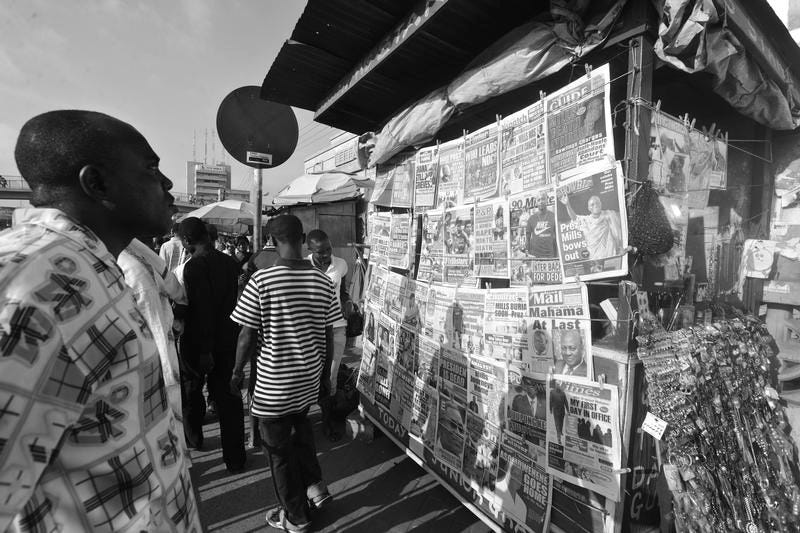Rethinking Africa’s Media Ownership: Who Should Control the Stories We Tell?
Africa’s media industry is at a defining moment. The continent's broadcasting industry is evolving rapidly as streaming platforms, TV networks, and digital broadcasters all vie for a key position in shaping the future of African storytelling. Local content is in high demand, and audiences are increasingly seeking narratives that reflect their identities and lived experiences. Yet, as African broadcasters and media executives weigh their content acquisition strategies, a fundamental question arises: Who truly holds the power to control the stories we tell? And more critically, who should control them?
In the ongoing rush to secure compelling content, African broadcasters typically have three dominant options at their disposal: licensing, co-production, and commissioning. Each strategy offers its benefits and challenges, yet the industry faces an emerging risk: the rise of airtime selling. This practice allows broadcasters to rent their space to the highest bidder, bypassing the responsibility of curating meaningful content altogether. This trend could erode the integrity of African media.
Licensing: Fast Content, Slow Cultural Growth?
Licensing content has long been a practical strategy for broadcasters looking to quickly fill their programming schedules without the hefty production costs. Developed markets have long relied on this approach, with media platforms acquiring rights to international films, TV series, and even popular local content from production houses. African broadcasters have followed suit, purchasing rights to Nollywood blockbusters, South African soap operas, and a mix of international series and films that promise high viewership.
The appeal of licensing is clear. It allows broadcasters to grow their content libraries without the financial risk of producing original content. In regions where established production houses churn out a steady flow of films and series, licensing is seen as a no-brainer. But Africa’s reliance on licensing comes with distinct challenges that could affect the continent’s ability to shape its own narrative and build a sustainable, culturally resonant media industry.
Brands Struggle to Differentiate
The biggest issue with licensing is that it doesn’t offer exclusivity. Licensed content is often available on multiple platforms simultaneously. As a result, broadcasters struggle to differentiate their brands from one another. If a popular Nollywood film is available on four different streaming services or TV networks, how does a platform build a distinct identity? Audiences, too, find it harder to form lasting connections with a platform if they are regularly exposed to the same material on competing services.
Temporary Ownership, Rising Costs
Licensing deals also come with expiration dates. Once the license expires, broadcasters lose the rights to air the content unless they renegotiate terms. This can be problematic, especially as licensing fees tend to increase over time. African broadcasters are often left with little negotiating power when it comes to renewing these deals. As a result, they are constantly forced to depend on external content sources, and that could affect their ability to retain audiences in the long term.
Lost Cultural Influence
Licensing content from abroad, or even from other African countries, may increase the volume of content available to broadcasters, but it misses an opportunity to curate and tell stories that are uniquely African. The licensed content comes from different cultural contexts, often shaped by the priorities and biases of non-African producers. This gap becomes particularly evident when content presented as “African” is devoid of local cultural touchstones.
While licensing should remain a part of any broadcaster’s strategy, an overreliance on it risks preventing African broadcasters from developing their own storytelling prowess. Without creating their own content, the continent may miss out on the opportunity to claim its rightful place in global media discussions. The future of African media should not be centered solely on distributing content made elsewhere but on fostering local, diverse, and dynamic voices that reflect Africa’s unique cultural landscape.
Co-Productions: The Promise and Peril of Global Partnerships
As Africa’s media ecosystem becomes more interconnected with international markets, co-productions have emerged as a key acquisition strategy. Co-producing content involves local filmmakers working with international studios or streaming platforms, splitting both production costs and creative input. The potential of co-productions to expand Africa’s global reach is significant, especially as international platforms increasingly look to tap into the continent's rich storytelling traditions.
At first glance, co-productions seem like the ideal solution for African broadcasters. Local producers gain access to larger budgets, advanced production facilities, and wider distribution channels, while global players can tap into Africa's untapped potential. However, as with all partnerships, co-productions come with their own set of challenges that can hinder the full realization of their potential.
Financial Relief for Local Producers
Local producers, particularly in developing media markets, often struggle with tight budgets and limited resources. Co-productions offer a solution by providing the financial backing necessary to bring high-quality productions to life. In turn, these co-productions can enjoy broader exposure, with films and series reaching global audiences on international streaming platforms like Netflix, Amazon Prime Video, and Showmax.
Creative Compromise
But co-productions are not without risks. Perhaps the biggest challenge in these partnerships is creative compromise. With multiple stakeholders involved, often from different cultural backgrounds, the final product may have to cater to a broader, international audience. This can result in the dilution of authentic African stories, as local filmmakers face pressure to make their narratives more “universal” or palatable to Western tastes. The authenticity of African stories may be watered down as producers attempt to meet the expectations of foreign investors.
Unequal Power Dynamics
Despite the allure of larger budgets and international exposure, African creatives may find themselves at the mercy of global media giants. In many cases, international platforms hold the lion’s share of editorial control and revenue, leaving local producers with little say in the final product. In some instances, African voices can be marginalized in favor of a more commercially viable approach. This underscores the need for African media companies to negotiate better terms, ensuring that the stories told remain true to their cultural roots.
Delayed Timelines
Co-productions are also notoriously time-consuming. With multiple parties involved, coordinating schedules and aligning interests across borders can extend production timelines. For broadcasters relying on a steady flow of content, co-productions may not be the most efficient option. The longer it takes to produce a series or film, the more difficult it becomes to maintain a fresh, dynamic content schedule.
While co-productions represent a promising avenue for international collaboration, African broadcasters must exercise caution. These partnerships should be pursued with careful consideration, ensuring that African storytellers retain creative control and that the narratives remain grounded in local cultural contexts.
Commissioning: The High-Cost Gamble That Pays Off
When it comes to content acquisition, commissioning original content is the most direct way for African broadcasters to control their narratives. By funding their own productions, broadcasters own the rights, control the storylines, and create content that is exclusive to their platforms.
Commissioning original content is not without risk. It requires a significant financial investment, and there is no guarantee that the content will resonate with audiences. However, the rewards can be substantial, as commissioning allows broadcasters to own their intellectual property and build unique brand identities.
Long-Term Revenue Potential
Unlike licensed content, which expires after a fixed period, commissioned content remains an asset that broadcasters can continue to monetize in various ways. For example, it can be syndicated to other networks, adapted for different markets, or repurposed into merchandise. This long-term potential makes commissioning a more sustainable strategy than relying on third-party content.
Authentic Storytelling
Perhaps the most compelling reason to commission original content is the ability to tell authentic African stories without compromise. When African creatives are in charge, the stories are more likely to be reflective of local cultures, identities, and traditions. Broadcasters that commission original content are not just distributors—they become the storytellers, shaping the narratives that define their audiences.
However, the challenge remains: commissioning is expensive. It requires upfront investment, and there are no guarantees of success. But in a rapidly changing media landscape, where African audiences are craving locally relevant content, commissioning offers the greatest opportunity to build a sustainable, culturally rich media ecosystem.
The Dangerous Rise of Airtime Selling
In addition to licensing, co-production, and commissioning, a troubling trend is emerging in Africa’s media landscape: airtime selling. This practice involves broadcasters selling their airwaves to anyone who can afford to buy them, essentially turning their platforms into content vending machines. At first, this may seem like a lucrative business model, but it comes with serious consequences.
Loss of Editorial Control
By selling airtime to the highest bidder, broadcasters lose control over the content that airs on their networks. This could lead to an influx of poorly produced, low-budget, or even misleading content that fails to meet audience expectations. Airtime selling compromises the editorial independence of broadcasters and undermines the very purpose of a media platform: to curate and deliver valuable content to its viewers.
Erosion of Brand Trust
As viewers become more discerning, they expect high-quality, meaningful content. If broadcasters prioritize profit over content quality, they risk eroding trust and alienating their audience. In a market flooded with options, losing credibility could be a death sentence for many media platforms.
A Race to the Bottom
If airtime becomes just another commodity, the entire industry suffers. Instead of fostering innovation, airtime selling rewards whoever can pay the most, regardless of the content’s quality or cultural significance. The focus shifts from creating valuable, impactful content to simply filling airtime slots.
For the future of Africa’s creative industry, airtime selling should be avoided. Instead, broadcasters should focus on developing curated, high-quality content strategies that put the audience’s needs and cultural relevance first.
Finding the Right Balance
Ultimately, the future of Africa’s media landscape hinges on finding the right balance between these various strategies:
License strategically—use licensing to supplement content libraries, but don’t rely on it as the cornerstone of your business model.
Co-produce wisely—enter partnerships that protect African narratives and allow for authentic storytelling.
Commission boldly—invest in original content that defines your platform’s voice and builds long-term brand identity.
Reject uncontrolled airtime selling—maintain editorial integrity and trust with your audience.
The future of African media rests on its ability to own, control, and shape its narratives. Broadcasters must move beyond being passive distributors of content and step into the role of active curators of culture. In doing so, they will not only thrive as businesses but also ensure that the stories of Africa are told by Africans, for the world to see.
A guest post by
A curious mind exploring the crossroads of creativity and insight.






